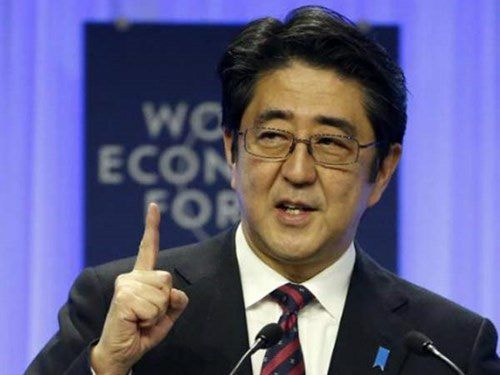Japanese Prime Minister Shinzo Abe: Moderate but steadfast
(Baonghean) - At the Asia-Africa Summit recently held in Jakarta, Indonesia, the speech of Japanese Prime Minister Shinzo Abe was highly anticipated by the world public. People wanted to see how Mr. Abe handled the promotion of Japan's role in world peace with the "rumors" surrounding the Yasukuni Shrine story. Mr. Shinzo Abe's performance did not disappoint the Japanese people when it showed flexibility but steadfastness. And their trust in their Prime Minister was further strengthened with the positive economic information that was just announced - a testament to the correctness of the personal Abenomics policy.
The New Path: Pride and Serenity
Before leaving the country to attend the Asia-Africa Summit, Japanese Prime Minister Shinzo Abe sent a “masakaki” offering to the Yasukuni Shrine – which honors Japanese soldiers who died in World War II. As usual, this move met with strong reactions from China and South Korea, as both countries believed that Mr. Abe should maintain the historical view of his predecessors – implying apologizing and accepting responsibility for what Japan did during World War II, instead of expressing admiration and gratitude at a shrine like Yasukuni. Stemming from the desire of South Korea and China to “maintain the historical view” of their predecessors, people expected an apology in Mr. Shinzo Abe’s speech at the Asia-Africa Summit. Such an apology would make sense given that Mr Abe's speech focused on promoting Japan's role as a "pioneer actively contributing to world peace".
 |
| Japanese Prime Minister Shinzo Abe. |
However, there was no apology from Shinzo Abe. Everyone acknowledged that Abe had expressed a very moderate attitude through his speech, saying that “Japan, with deep remorse for World War II, promises to be a nation that respects the principles of peace, whatever the situation”, and pledged not to carry out “aggressive acts or use force against the territorial integrity or political independence of any country”. However, if people hoped that Abe would continue to repent for what happened in the past, to show that repentance through “proper” behavior at the Yasukuni Shrine, then Abe showed his steadfastness with a completely different argument. For him, past and present, remembrance and ambition are concepts that cannot be equated. For him, it is time for Japan to look at its path since World War II with pride and serenity. That approach was based on “feelings of the heart” and aimed at Japanese pacifism.
In addition, people also feel the contradictions in his statements about peace with what Mr. Abe has been doing recently to strengthen his defense power. His passing of the law allowing Japan to export weapons, seeking to reinterpret the Constitution and allowing the expansion of the right to collective self-defense, or changing the principles of defense cooperation with the US... are interpreted by some countries as "aggressive, belligerent", making Japan a dangerous country. However, Mr. Abe has affirmed that Japan certainly does not "dream" of dominating the world or anything similar. What he is doing is to make Japan a powerful, confident, proactive country in the face of all threats, actively participating in world security issues, and he will steadfastly fulfill this wish.
Economy - the indispensable pillar of powerful Japan
The Japanese people can be proud of what their leader has shown at the Asia-Africa Summit, where Japan was promoted as a peace-loving nation, for peace, but not by wallowing in remorse and regret for the past. Accepting to do things differently from his predecessors, Mr. Shizo Abe is proving himself to be a Prime Minister who is steadfast in the interests of the nation.
In addition to his dealings with international partners, at the same time, Mr. Abe's credibility has also been "added points" thanks to good news about economic growth. In a report recently released by the Japanese Ministry of Finance, the country has achieved a trade surplus for the first time in nearly 3 years. Up to now, there have been no official statistics on the growth of the Japanese economy in the first quarter of 2015, but with the previous recovery momentum in the fourth quarter of 2014 (growth of 2.2% - marking the first increase after 3 quarters), plus positive signals in the manufacturing sector in February and March 2015 (growth of 0.3% compared to the same period) and statistics on trade surplus, Japan is hoping to achieve good growth results in the following months of 2015, bringing GDP growth in 2015 to 2.7%. Of course, for the Japanese, any statistics will mean less than the government's pledge that household incomes will increase in fiscal year 2015.
In the context of still having disagreements about the Abenomics economic policy introduced by Prime Minister Shinzo Abe since 2013, the positive signals of the economy - although not yet confirming a steady upward trend, will also help the Japanese people to have more confidence in the path that Mr. Abe has chosen. And certainly, more than all his people, Mr. Shinzo understands that there will be no strong, self-reliant Japan as he wishes without a strong economy, which also means there will be no way back for Abenomics after 2 years of implementation.
Thuy Ngoc






